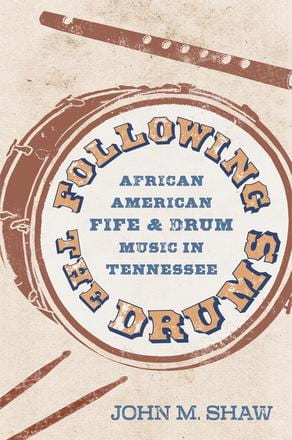
John Shaw (BM ’93, MM ’20) was recognized for his Following the Drums: African American Fife & Drum Music in Tennessee, published by the University Press of Mississippi, as one of four finalists for the Wayland D. Hand Prize from the American Folklore Society for an outstanding book integrating folkloristic and historical approaches and/or evidence out of a large pool of submissions.
“I was absolutely astounded that it was nominated. It’s an awesome surprise, and it just motivates me to dig deeper into the ethnomusicological work I am currently doing,” said Shaw.
Shaw has been fascinated by Black fife and drum music since he first became aware of Otha Turner and the Rising Star Fife and Band near Senatobia, Mississippi. He has always been interested in African-American drumming styles, as he was aware of the importance of drums in African culture. He suspected there were attempts in Black American drumming to reconnect with an African or Afro-Caribbean past. But his motivation for the thesis, which became a book, was learning that there was a Black fife and drum band in his hometown of Bartlett, Tennessee, where he still resides.
“Learning that there was such a band called the United Sons and Daughters of Zion No. 9 Fife and Drum Band and that it was led by Columbus “Lum” Guffin was eye-opening,” said Shaw. “I went to high school with one of Guffin’s grandsons. So, this became very personal to me.” He also understood the imperativeness of capturing these historical accounts and information before it was too late. “The generation of the African-American community that can recall fife and drum bands and other older folk styles is passing rapidly, and the need to do this research now is of the essence,” adds Shaw.
The digitization of newspapers facilitated Shaw’s research, which made his work unexpectedly easier than he had initially anticipated. Thanks to the internet revolution, historical newspapers have been converted into digital format, allowing for quick and efficient searches spanning hundreds of years using keywords such as “fife” and “drum.” In his research, Shaw discovered a wealth of documentation about Black bands, particularly emphasizing their prominence during the Reconstruction era. While he had anticipated finding extensive stories about these bands, what surprised him was the ability to piece together vignettes or narratives about the leaders of these Black bands during the Reconstruction era.
“I woke up in the night about a year ago with a sentence fragment that has stayed with me, ‘to shine a light on the forgotten.’ I think that is a good summary of my emphases as an ethnomusicologist. There are bands, individual musicians and communities that have been forgotten, and they don’t deserve to be forgotten,” said Shaw. “Doing this work can hopefully bring some attention to these deserving artists or their children, and it is also a way of paying back the many African-American musicians and music scholars who mentored me from my teenage years until now.”

Shaw also credits Dr. David Evans, professor emeritus of musicology, for his inspiration and encouragement.
An international jury made the selection of scholars. The prize winner chosen from the finalists will be announced at the American Folklore Society annual meeting in Portland, Oregon, in November.
Following the Drums: African American Fife and Drum Music in Tennessee is an epic history of a little-known African-American instrumental music form. John M. Shaw follows the music from its roots in West Africa and early American militia drumming to its prominence in African American communities during Reconstruction, both as a rallying tool for political militancy and community music for funerals, picnics, parades, and dances.
Carefully documenting the music’s early uses for commercial advertising and sports promotion, Shaw follows the strands of the music through the nadir of African American history during post-Reconstruction up to the form’s rediscovery by musicologists and music researchers during the blues and folk revival of the late 1960s and early 1970s. Although these researchers documented the music, and there were a handful of public music performances at festivals, the story has a sad conclusion. Fife and drum music ultimately died out in Tennessee during the early 1980s.
Newspaper articles from the period and interviews with music researchers and participants reawaken this lost expression, and specific band leaders receive the spotlight they so long deserved. Following the Drums is a journey through African American and Tennessee history, with a fascinating form of music powering the story.
John M. Shaw is an ethnomusicologist, music researcher, writer, musician, composer and blogger. He graduated from the University of Memphis in May of 2020 with a master’s of music in musicology and is currently a graduate assistant and doctoral student at the institution. His emphases are on the music of the African Diaspora and the impact that African-American music has had on the concert music tradition. He is the author of the book Following The Drums: African-American Fife and Drum Music in Tennessee released by University Press of Mississippi. He is working on Action Speaks Louder Than Words: African-American Music and the Recording Industry in Shreveport 1948-1998.
The book may be purchased through the University Press of Mississippi.
